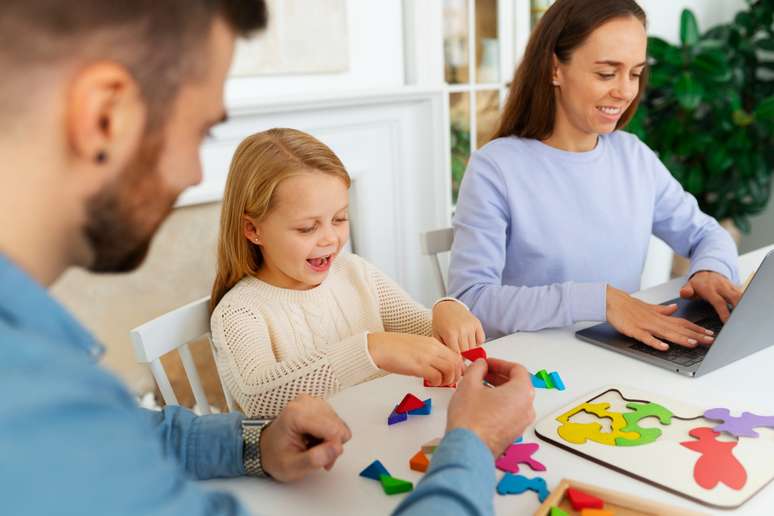The expert emphasizes that one of the essential values is resilience: the possibility of growing in the face of challenges.
What to teach the little ones to make them become functional adults with social skills?
A successful project in the formation of children is the sum of respect for essential rights, quality education and parents attentive to the shades of education received at home. “In a world in constant transformations, the family remains the oldest, fundamental and more resistant of human institutions. It is in this unique environment than the first experiences of affection, solidarity and learning flows”, underlines the psychologist and teacher of the University of Guarulhos (UNG), Alessandra Chostomo.
But how to ensure that the first experiences are favorable and stimulating? How do you make sure that parents manage to develop children’s self -esteem? Is it possible for them to contribute to children to choose healthy relationships in the future and know how to express themselves in adulthood? Although it is not possible to establish certainties, it is valid to bet on the possibilities. This means that a functional adult, added to its environment and with recognized social skills, may have assimilated significant values at home.
“In addition to a space of affection, the family acts as a main cultural transmission agent. It is through it that the moral, ethical and religious values have passed from generation to generation”, recalls the psychologist. Although these values can vary on the basis of cultural and social contexts, some remain relevant in the 21st century, according to the psychologist. Check:
1 – Self -confidence
The little ones must trust themselves. They should also feel comfortable in living in society. Therefore, it is up to parents to stimulate new learning efforts and honors, even in the face of failures in the first attempts. In childhood, self -confidence, which is cousin of self -esteem, is also consolidated when adults support children’s interests and show unconditional love.
2 – Love
For psychology, love is the basis of emotional security. Therefore, this value is not negotiable in the relationship between parents and children. While the child assimilates himself from experience, he must be exposed to demonstrations of affection to feel appreciated and safe in the family. But love does not mean making all the concessions to the little ones, but expressing affection and commitment, with established limits.
3 – Resilience
Parents and guardians should explain to their children that frustrations are part of life. As in games, sometimes we receive a game; Other times, we lose. It is not a demerit to lose, because we always discover new lessons and test different solutions. Whenever something does not work, we have the opportunity to learn. This is resilience. Therefore, the challenges represent growth opportunities.
4 – Responsibility
It is important to encourage the child to take responsibility: they must participate in household chores and be encouraged to take care of their things. When they embrace responsibilities, the little ones seal a relationship of trust with adults. And develop notions of community, root of harmonious coexistence. Therefore, they should also be charged if they do not comply with the already agreed obligations.
5 – Honesty
It is not enough to defend honesty in theory: you have to practice it in everyday life. If parents speak of the importance of honest attitudes, but act in an opposite way in daily situations, the child is confused in the face of contradictory messages. Hence the importance of consistency. “The transmission of values takes place mainly through the examples of parents”, says the psychologist and teacher Alessandra Chrostomo.
6 – Emotional intelligence
Children should be encouraged to understand their emotions and communicate their feelings to parents and guardians. This is what puts emotional intelligence in adulthood. When the child is sad, it is worth asking her to outsource what she feels, arousing her ability to face this emotional burden. Tip: bet on games with human figures interpreted by facial expressions that indicate feelings, such as fear, anger, wound, shame, etc.
7 – Alterity
Alterity is called the ability to put the other in place. And also to recognize and respect the differences between people. From an early age, the little ones should learn to familiarize yourself with these differences: no one is better than anyone because of the breed or religion, for example. “The change develops empathy, fights prejudice and discrimination, strengthens the ties and prepares for the future,” says Alessandra Christomo.
Books, films and games communicate the values
Parents who do not know where to start can resort to books, animations, toys and games. “Children learn a lot through the observation and experience of symbolic situations. Books and films work with narratives that present characters who face ethical dilemmas, making choices, learning respect, empathy, cooperation and responsibility”, says the psychologist Alessandra Chrostomo. Likewise, games, provided that they are adequate to each age group, are also positive tools, especially if parents want to teach conflict resolution, teamwork and the management of frustration.
Animation suggestions for children
Moana (2016) and Moana 2 (2024)
In the adventures of Princess Polynesia, children identify family connections and the power of self -confidence. Moana is fearless and trusts her skills to save her people and then the world.
Fun 1 (2015) and Fun 2 (2024)
In this animation, in which emotions have their own life, the little ones are presented to diversity: each emotion has a unique nature and reacts specifically to events.
The boy, the mole, the fox and the horse (2022)
In making friends with these animals, the title of the title ends up offering moving lessons on the strength of the affection, the importance of the company and the clash of fear.
Source: Terra
Ben Stock is a lifestyle journalist and author at Gossipify. He writes about topics such as health, wellness, travel, food and home decor. He provides practical advice and inspiration to improve well-being, keeps readers up to date with latest lifestyle news and trends, known for his engaging writing style, in-depth analysis and unique perspectives.





![Tomorrow belongs to us in advance: New novel Seth! … what awaits you for a week until August 25, 2025 [SPOILERS]L Tomorrow belongs to us in advance: New novel Seth! … what awaits you for a week until August 25, 2025 [SPOILERS]L](https://fr.web.img5.acsta.net/img/02/49/0249aafc9fa4e22742826bf6d981c8c3.jpg)


